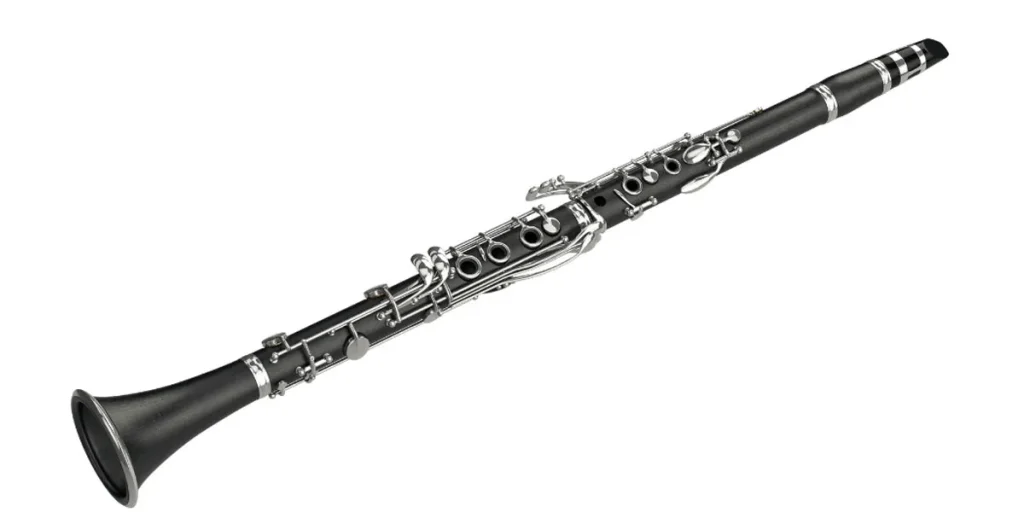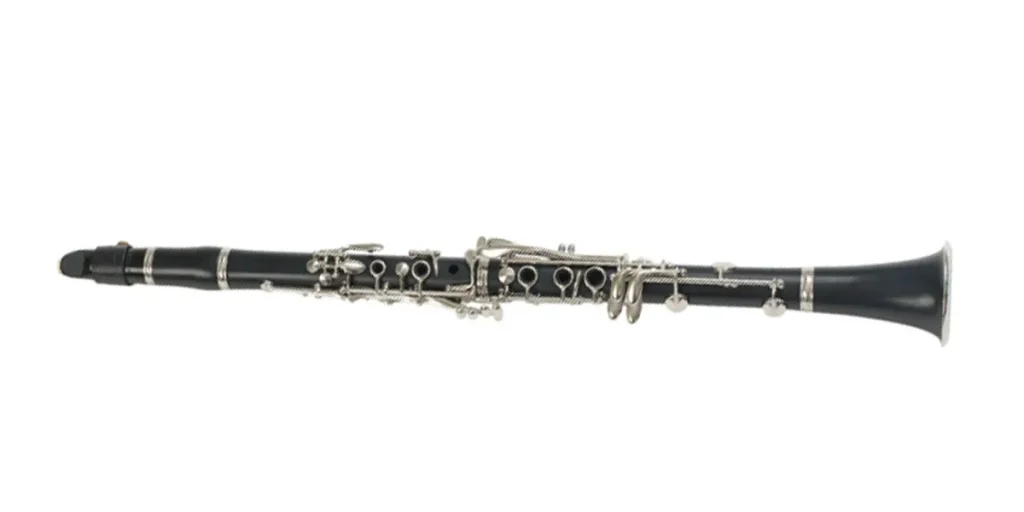A typical Bb clarinet weighs around 1.5 pounds (680 grams). These weights can slightly vary based on materials and manufacturing differences.
Embarking on the musical journey with a clarinet opens up a world of expressive possibilities.
Known for its versatile sound that blends beautifully with other instruments, the clarinet holds a prominent place in orchestras, jazz bands, and as a solo instrument.
Weighing in at just over a pound, it offers remarkable portability for musicians of all ages. This lightweight nature underscores its popularity, especially for young players who might find heavier instruments challenging.
With its complex and resonant tones, the clarinet continues to captivate music enthusiasts, contributing its unique voice to diverse musical genres from classical to contemporary styles.
Whether you’re performing in a concert hall or practicing in the comfort of your home, a clarinet’s weight won’t be a burden, inviting extended practice sessions and comfort during performances.
The Average Weight Range Of Clarinets
Picture yourself holding a clarinet. It feels light, right? Clarinets are known for being easy to manage. Their weight is favorable for musicians of all ages.
Generally, a clarinet weighs between 1.5 to 3.5 pounds (0.68 to 1.59 kilograms). Different factors can change this weight. Let’s look into what makes a clarinet heavier or lighter.
Factors Influencing A Clarinet’s Weight
Materials used can make a big difference. Wooden clarinets tend to be heavier. Plastic or resin models are lighter. Each piece, from the mouthpiece to the bell, adds ounces. Even the keys and their material count.
- Wood type (grenadilla, rosewood)
- Key material (nickel, silver)
- Pads and corks
- Size and design complexity
Comparison Across Clarinet Types
Not all clarinets tip the scales the same way. A Bb clarinet, a common choice, might be around 2 pounds (0.91 kilograms).
A bass clarinet, being larger, can be near 9 pounds (4.08 kilograms). See this table to compare:
| Type of Clarinet | Average Weight |
|---|---|
| Bb Clarinet | 2 lbs (0.91 kg) |
| Bass Clarinet | 9 lbs (4.08 kg) |
| Eb Clarinet | 1.5 lbs (0.68 kg) |
| Alto Clarinet | 5 lbs (2.27 kg) |
Material And Design Impact On Clarinet Weight

Clarinets come in various shapes and sizes, each unique in design and material. These factors contribute significantly to the final weight of the instrument.
A clarinet’s heft can influence a musician’s comfort and playability. Let’s delve into how different materials and design aspects can affect the overall weight of a clarinet.
Wood Vs. Plastic Clarinets
Clarinets are traditionally made of wood or plastic, each with its weight implications:
- Wooden clarinets are typically crafted from Grenadilla or rosewood. These woods are preferred for their tonal qualities but add to the weight.
- Plastic clarinets, made from ABS resin, are lighter. They offer ease of handling, especially for young players or marching bands.
| Material | Average Weight |
|---|---|
| Wood | Approx. 1.5 lbs |
| Plastic | Approx. 1 lb |
The Role Of Metal Components
The presence of metal in a clarinet’s design, including keys, rings, and rods, is crucial for functionality. These parts, typically made from nickel or silver, can tip the scales:
- Nickel components are sturdy but heavier, adding to the overall weight.
- Silver parts, while lighter, require careful handling to maintain.
Detailed specifics reveal metal components may add an extra 0.3 to 0.5 lbs to the instrument’s weight.
This addition affects the balance and weight distribution, impacting the player’s comfort during long sessions.
Weight Variations Among Different Clarinet Brands
Clarinet players often wonder how much their instrument weighs. Weight can affect comfort and performance.
Different brands offer clarinets in various weights. Let’s explore these differences.
Popular Brands And Their Typical Weights
Each clarinet brand has its unique design. This design impacts the instrument’s weight. Below are some popular brands and their typical weights:
| Brand | Weight (Approx.) |
|---|---|
| Buffet Crampon | 1kg (2.2lbs) |
| Yamaha | 0.8kg (1.8lbs) |
| Selmer | 1.1kg (2.4lbs) |
| Leblanc | 0.9kg (2lbs) |
These weights include the total of the clarinet components. They do not include the case.
Custom Models And Weight Considerations
Custom clarinets offer personalized features. These features often affect the weight. Here are some considerations for custom clarinets:
- Material: Woods like Grenadilla or synthetic materials change the weight.
- Keys: More keys mean more metal, adding weight.
- Customization: Personal touches can add or reduce weight.
Selecting a custom clarinet involves balancing weight with desired features. The perfect clarinet feels right in your hands and delivers the sound you love.
Player’s Perspective On Clarinet Weight

Imagine holding a delicate, long partner in music: the clarinet. Its weight feels almost like cradling a newborn bird in your hands.
Players, young and old, can feel the difference a few ounces make during hours of rehearsal or performance. Checking clarinet weight matters because comfort leads to better playing.
Ergonomics And Handling
Handling a clarinet isn’t just about making music; it’s about finding harmony with the instrument. You want an extension of your body, not a battle against it. Consider these points:
- Material matters: Wooden clarinets offer a warm sound but often weigh more than plastic.
- Balancing the bell: The bell’s weight affects your wrist’s comfort.
- Grip and rest: Proper thumb rests reduce hand fatigue.
Adaptations for prolonged use, like neck straps or ergonomic thumb rests, support players in mastering their craft without the strain.
Weight’s Effect On Performance And Comfort
Does a few grams really make a difference in performance? Absolutely. Even a slight increase in weight can impact a player over time. Signs include:
- Tired fingers
- Wrist strain
- Overall discomfort
Performance suffers when you’re more focused on pain than piccolos. Seek lightweight models for prolonged comfort, particularly for marching bands or younger players.
Encourage frequent breaks during practice to minimize discomfort.
| Clarinet Type | Average Weight |
|---|---|
| B♭ Soprano | Approx. 0.8 kg |
| Bass | Approx. 2.3 kg |
Weighing Professional Clarinet Models
Professional clarinets are masterpieces of craftsmanship and design. Their weight can greatly influence a musician’s comfort and performance.
With various brands and models available, selecting the right professional clarinet model is crucial.
This case study delves into the intricacies of different high-end clarinets to see how they stack up in terms of weight.
We seek insights from seasoned clarinetists to understand their preferences and experiences.
Examining High-end Clarinets
Top clarinet brands like Buffet Crampon, Yamaha, and Selmer produce high-end models.
These instruments feature premium materials such as African blackwood and silver-plated keys. Let’s compare their weights:
| Brand | Model | Weight (pounds) |
|---|---|---|
| Buffet Crampon | R13 | 1.8 |
| Yamaha | YCL-650 | 2.2 |
| Selmer | Privilege | 1.9 |
We notice that weights are slightly different. Each clarinet’s balance and feel can significantly affect a player’s choice.
Insights From Professional Clarinetists
Feedback from professional players is invaluable in our study. Their hands-on experience sheds light on how these weights perform in real life.
- Many prefer the lightweight Buffet R13 for its ease of handling during long concerts.
- The slightly heavier Yamaha YCL-650 is favored for its stable feeling and durability.
- Some appreciate the Selmer Privilege’s weight for its balanced distribution and rich tone.
These insights highlight that the weight of a clarinet can be a personal preference, influenced by the player’s physical comfort and the instrument’s sound quality.
Weight As A Selection Criterion
Exploring Purchasing Tips: Weight as a Selection Criterion is key when choosing a new clarinet.
The instrument’s weight significantly impacts comfort, playability, and overall enjoyment.
Whether you are a marching band player or a concert performer, understanding how weight influences your choice will aid in selecting the ideal clarinet.
Assessing Importance Of Weight For Buyers
When considering a new clarinet, weight plays a pivotal role for many musicians. For younger players or those with smaller frames, a heavy instrument could lead to fatigue and discomfort.
On the other hand, more experienced players might prefer a denser material that often accompanies a richer sound.
Think about your physical needs and endurance before making a decision.
Here’s why weight matters:
- Increased Comfort: Lighter models may reduce strain on the hands and shoulders.
- Endurance: Less weight could lead to longer practice sessions without discomfort.
- Quality of Sound: Heavier clarinets often produce deeper, more resonant tones.
- Material Durability: Weight can also be an indicator of the durability of the materials used.
Testing The Feel Before Buying
Hands-on testing is crucial. A “test drive” will confirm if the weight of the clarinet is suitable for your physical comfort and playing style.
Follow these steps to test:
- Visit a music store with a wide range of clarinets.
- Hold and play each clarinet to gauge how it feels.
- Consider trying standing and sitting positions.
- Seek models that feel balanced and easy to maneuver.
- Note if you feel any strain or discomfort after playing.
Selecting a clarinet involves more than just weight, yet it’s a fundamental aspect often overlooked.
Balance comfort with sound quality to settle on an instrument that will support prolonged use.
Through careful consideration and testing, find a clarinet that feels like an extension of yourself—one that you can play with ease and joy for years to come.
FAQs About the Weight of a Clarinet
What Is The Average Weight Of A Clarinet?
The average clarinet weight is approximately 1. 5 to 2. 3 pounds. This can vary based on the material and model.
Professional models may be slightly heavier due to denser wood or additional keys.
Does The Clarinet’s Weight Affect Playability?
Yes, the weight of a clarinet can affect playability and comfort. Heavier clarinets may cause fatigue over time but often produce a richer sound.
Lighter models are easier to handle, especially for beginners or younger players.
Are Bass Clarinets Heavier Than Standard Clarinets?
Bass clarinets are indeed heavier, weighing around 10 to 12 pounds.
Their larger size and extra components contribute to the additional weight compared to standard Bb clarinets.
How Do Different Clarinet Materials Impact Weight?
Clarinet weight varies with material: plastic models are lighter, around 1. 5 pounds, while wooden ones can reach up to 2. 3 pounds. Wooden clarinets offer a warm tone but are heavier.
Conclusion
Understanding the weight of a clarinet is key for musicians of all levels. Whether for transport, performance, or comfort, a clarinet’s mass impacts your experience.
From sleek soprano to robust bass clarinets, they range from 0. 5 to 2 kg. Choose wisely to harmonize with your musical journey.
Resources:
https://www.loc.gov/resource/ihas.100010593.1/?sp=1
https://www.juilliard.edu/music/instruments/woodwinds/clarinet
